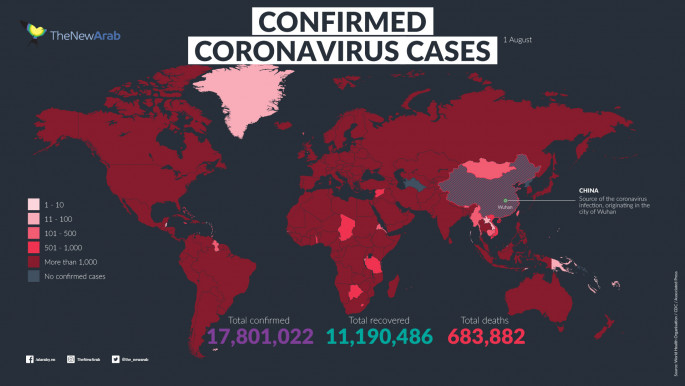The Middle East at war with coronavirus: Top stories from 1 June
1. Iran says coronavirus cases jump nearly 3,000 in a day
"People seem to think the coronavirus is over... some officials also believe everything" is back to normal, said Health Minister Saeed Namaki.
"The coronavirus is not only far from over, but we could at any moment see (another) dangerous peak," he said in a televised interview.
Ministry spokesman Kianoush Jahanpour raised Iran's caseload to 154,445 with 2,979 new infections recorded in the past 24 hours.
He added that the virus had claimed another 81 lives in the past day, up by 18 compared with Sunday and raising the total to 7,878. Read more here.
2. Turkey's restaurants, cafes and iconic Grand Bazaar reopen
Many other facilities including parks, beaches, libraries and museums also reopened across the country, while millions of public sector employees returned to work.
Bars and nightclubs remained closed. Restaurants and cafes, reopening for the first time since March 16, must operate under strict rules.
 |
| Click to enlarge |
Domestic flights also resumed between a limited number of cities as an inter-city travel ban was lifted.
The national flag carrier Turkish Airlines said its first plane since the ban took off from Istanbul to the capital Ankara at 0700 GMT Monday. Read more here.
3. State-owned Emirates Airline cuts jobs over coronavirus crisis
The UAE's Emirates Airline said it will have to start laying off staff, while many of its planes remain grounded due to the coronavirus pandemic.
The government-owned airline has laid off trainee pilots and cabin crew, according to a report by Reuters, which cited company sources.
The Dubai-based airline, which has around 60,000 employees, did not say how many of their workers were affected by the decision. Before the coronavirus crisis limited flight operations, Emirates was flying to 157 destinations in 83 countries.
According to reports, staff who were on probation were notified on Sunday that their contracts would be terminated in June. Read more here.
Twitter Post
|
4. West Bank poverty may double over pandemic as annexation looms
Poverty in the occupied West Bank may double as Palestinians are hit by the coronavirus, the World Bank warned Monday, just weeks before Israel aims to kick-start plans to annex parts of the territory.
The United Nations has warned that such a move by Prime Minister Benjamin Netanyahu's government would stifle financial and aid flows to the Palestinians and "most likely trigger conflict".
Israel may start the annexation process as soon as July 1 with the support of US President Donald Trump, who in January published a peace plan that was roundly rejected by the Palestinians.
The UN warned in a report Sunday that, without improved relations between the two sides and if annexation goes ahead, "the achievements of the Palestinian government over the last quarter century will fade.
"The peace and security situation will worsen, and a hardened and more extremist politics on both sides will inevitably result," it said.
The Palestinian territories have seen low infection rates after acting quickly to curtail the spread of Covid-19, with three deaths out of 450 cases registered among some five million residents in Gaza and the West Bank.
But the Palestinian Authority's (PA's) financial situation is "expected to become increasingly difficult" due to loss of income and increased spending on healthcare and other areas, the World Bank said in a report.
The fallout is expected to see the number of households living below the poverty line rise this year from 14 to 30 percent in the West Bank, largely due to Palestinians being unable to cross into Israel for work. Read more here.
5. Abu Dhabi locks down with one-week travel ban
Abu Dhabi has announced it will cordon off the UAE's capital as well as banning travel between regions within the emirate for a week from Tuesday to rein in the novel coronavirus.
The announcement on Sunday means that residents of the United Arab Emirates will not be allowed to travel from the capital Abu Dhabi to the services hub of Dubai, 90 minutes on a major highway, without a permit.
The decision came as the authorities said they were easing other restrictions within Abu Dhabi, one of the seven emirates that make up the UAE.
The authorities placed "a ban on movement entering and exiting the emirate and between its regions" from June 2, the Abu Dhabi media office tweeted on Sunday.
It added that residents may move freely within their own regions between the hours of 6am and 10pm.
But malls, restaurants, and hotel beaches will be allowed to reopen on Monday at 40 percent capacity, the media office said. Read more here.
Follow us on Facebook, Twitter and Instagram to stay connected



